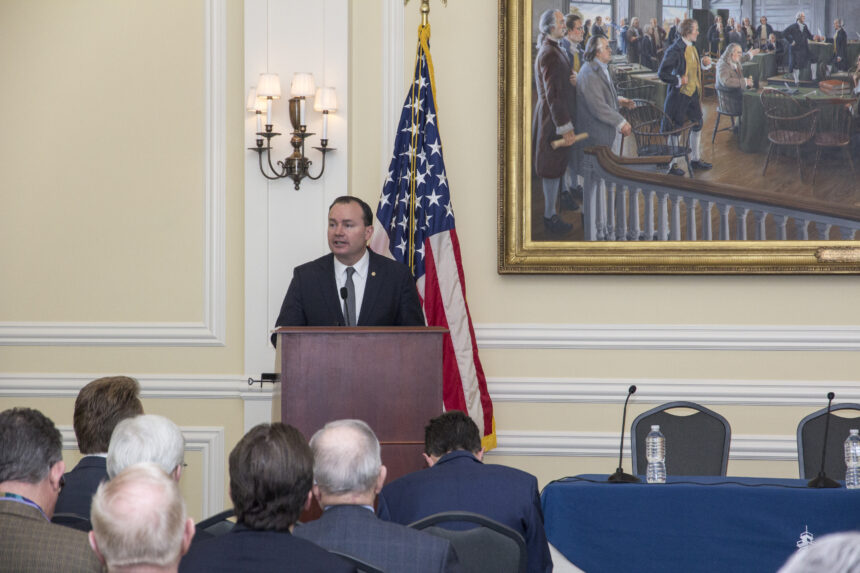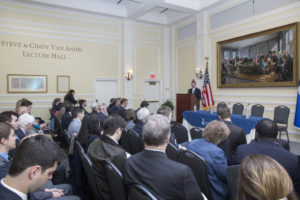Standing under “The Signing of the American Constitution” painting, Sen. Mike Lee, R-Ut., introduced an initiative to revive Article I of that document at the Allan P. Kirby Jr. Center for Constitutional Studies and Citizenship Feb. 3.
“The American people are hurt when Congress refuses to do its job, outsources its job, delegates it job over to the executive branch,” Lee told the Collegian. “The American people become less powerful. Their voice doesn’t matter as much when Congress doesn’t do its job.”
The Article I Project, known as A1P, aims to place the superiority of the federal government into the legislative branch again, returning that power to those who are directly elected by and accountable to the people. Through new legislation and reinstating traditional regular order, two senators and eight representatives will try to recover Congress’ authority with information and research from Hillsdale College.
“I certainly hope Hillsdale College can be a resource to us and provide us with influential insight,” Lee said. “Hillsdale College is an institution dedicated to the principles of good government and of a constitutionally limited government. It makes it a good fit, as well.”
Lee and Rep. Jeb Hensarling, R-Texas, are leading this Republican, bicameral initiative that looks to reclaim the power of the purse and budget, take back authority over regulation, and redefine standards of executive discretion by drafting new laws. They also look to reform omnibus bills and “cliff” legislation that threaten government shutdowns.
“It’s been this gradual building realization ever since I’ve gotten here seeing how the deep the problem really runs,” Lee said. “The fact that most laws are no longer made by Congress, that creates all types of problems.”
One such piece of legislation is the One Subject at a Time Act by Rep. Mia Love, R-Ut. It aims to ban the attachment of unrelated and controversial legislation onto must-pass bills.
“Outside interests pin their hopes to stronger host legislation. This leaves voting members of Congress to either vote yes and accept a pyrrhic victory or vote no and throw the baby out with the bathwater,” Love said to the Collegian in an email.
“My bill would ensure every legislative issue is forced to stand on its own legs, and every member of Congress is held accountable for his or her actions,” Love said. “And it would also ensure that we, as legislators, are the only ones deciding what to spend taxpayer dollars on instead of just signing off on the decisions of outside groups.”
Additionally, the representatives and senators look to reestablish regular order, the sequence of steps that Congress uses to make, debate, and pass or reject legislation and appropriate funds. Matthew Spalding, associate vice president and dean of educational programs for the Kirby Center, said Congress has moved away from regular order because of its delegation of powers to the executive branch.
“There’s an increasing recognition that that’s the problem,” Spalding said. “The most important key to that is rebuilding a strong Congress that understands legislative responsibilities.”
In the meantime, the Kirby Center is working with Republican House leadership and members working on A1P.
“The Kirby Center is an extension of Hillsdale’s teaching mission,” Spalding said. “We’re interested in reviving constitutional government and encouraging those who would like to do so but also teaching them the best way to think about constitutional questions.”
Hillsdale will contribute to and push forward discussions by holding events and smaller working groups at the Kirby Center in addition to providing relative information.
“We have studied the Constitution and the way of governing it establishes since the beginning of the college,” President Larry Arnn said in an email. “Now there is a new way of governing, with different objects, and we have studied that, too. We seek to make the contrast known. These are big subjects, and we may be wrong about them, but we take care not to be.”
Lee said two stacks of papers in his office inspired A1P about a year ago. One with only a couple hundred pages is the laws Congress passed last year while the other, which is 11-feet tall with 80,000 pages, contains the federal regulations issued.
“Both sets of documents impose binding obligations on the American people,” Lee said. “The difference is that the small stack is passed into law by elected representatives of the people.”
Lee said having elections makes those in Congress accountable to the American people while administrators in the executive branch are not.
“Minute by minute we have seen Congress delegating its lawmaking power to the executive branch bureaucracy that has diminished the accountability of the federal government to the people,” Lee said. “It hurts Americans.”
Spalding said this outsourcing of power dates to the days of progressivism, beginning in the late 1800s when the country was growing in size and complexity.
“The original motivation was efficiency and administration,” Spalding said. “What is has become is really a mess of vast and extensive regulations in every aspect of our lives.”
More recently, however, the debate has returned its focus to the separation of powers that have gone “out of wack,” Spalding said. He referenced the debates leading up to the selection of Rep. Paul Ryan, R-Wisc., for speaker of the House in October.
“The debate was driven by a push by conservatives to get the majority to focus on legislative powers, balancing budgets, being fiscally responsible,” Spalding said. “The fact that you have a speaker, who at least intellectually recognizes that, opens this discussion.”
A1P, however, requires more than Congress’ approval, Spalding said.
“When it comes to legislation, it is highly doubtful anything will occur until the next president is in office,” Spalding said. “What you’re doing is setting up and defining the things that would be focused on in the next administration.”
Lee said the president must read the Constitution and believe in its structures of federalism and separation of powers, which the national government has neglected, in order that A1P succeeds.
“It needs to be somebody who has a strong commitment to the Constitution itself, someone who will honor his or her oath to uphold, protect, and defend the Constitution,” Lee said.
Lee said he sees those attributes in his colleagues and GOP presidential contenders Sens. Ted Cruz of Texas and Marco Rubio of Florida.
“I believe they are devoted to restoring those provisions of the Constitution that have been neglected, overlooked over the course of many years,” Lee said.
Until a new administration comes, Lee said he and his colleagues will work on creating bills that return the superior power to Congress as the Founders intended when signing the Constitution.
Love said she thinks the legislation will be successful.
“Just by raising awareness of our current problems and getting people to talk about them, I think we’re having a level of success. But there’s also a clear appetite for real change in the electorate,” Love said. “I think there’s a good chance our bills will pass.”


